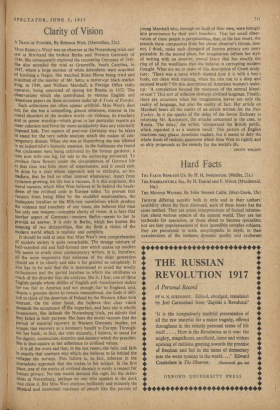Clarity of Vision
MISS REBECCA WEST was an observer at the Nuremburg trials and saw at first-hand the broken Berlin and Western Germany of 1,946. She subsequently explored the recovering Germany of 1949. She also attended the trial at Greenville. South Carolina, in 1947, where a large number of white defendants were acquitted of lynching a Negro. She watched Brian Hume being tried and acquitted of the murder of Mr. Setty, a motor-car black-market king, in 1949, and William Marshall, a Foreign Office radio operator, being convicted of spying for Russia in 1952. The observations which she contributed to various English and American papers on these occasions make up A Train of Powder. young Marshall who, through no fault of their own, were brought into prominence by their son's treachery. That her social obser- vation of these people is perspicacious, that, in the last resort, she extends them compassion from her clever observer's throne, does not, I think, make such disregard of human privacy any more palatable. In the second place, her imagination infuses her style of writing with an emotive, unreal fancy that has exactly the ring of all the woolliness that she believes is corrupting modern thought. What arc we to make of this description of Greek sculp- ture: 'There was a torso which showed how it is with a boy's body, cut clean with training, when the ribs rise to a deep and enjoyed breath'? Or this description of American women's make- up : 'A complexion beyond the resources of the normal blood- stream'? This sort of inflation destroys civilised language. Finally. there are occasions when her imagination leaves not only the reality of language, but also the reality of fact. Her article on Marshall bears all the marks of an article written for the New Yorker. In it she speaks of the delay of the Soviet Embassy in returning Mr. Kuznetsov, the attache concerned in the case, to Russia. 'The delay,' she writes, 'exasperated the British public, which regarded it as a wanton insult.' This picture of English reactions may please American readers, but it seems to defy the whole thesis of realistic statement which Miss West so rightly and so ably propounds as the remedy for the world's ills.
ANGUS WILSON


































 Previous page
Previous page